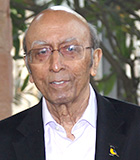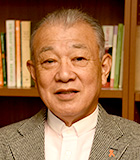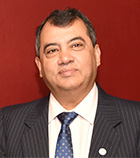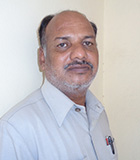Global Campaign for Leprosy Elimination

Leprosy is one of the oldest diseases known to humankind. Long feared for its disfiguring effects, it is now fully curable with multidrug therapy (MDT), a treatment introduced in the 1980s. Today, the annual number of new cases reported worldwide is around 200,000. With early diagnosis and treatment the disease leaves no trace.
However, deep-rooted myths and misconceptions about the disease mean that persons affected by leprosy, and even their family members, continue to suffer discrimination in many parts of the world. Leprosy is not just a health issue, it is also an issue of basic human rights.
Responding to the appeals made by Mr. Yohei Sasakawa, Chairman of The Nippon Foundation, who also serves as the WHO Goodwill Ambassador for Leprosy Elimination and as Japanese Government Goodwill Ambassador for the Human Rights of Persons Affected by Leprosy, the Government of Japan took an initiative to submit a series of resolutions on this issue to the UN. In December 2010, the UN General Assembly unanimously adopted resolution A/RES/65/215 “Elimination of discrimination against persons affected by leprosy and their family members.” The resolution is accompanied by the Principles and Guidelines drawn up by the UN Human Rights Council Advisory Committee to achieve the goals of the resolution.
However, much remains to be done. The most recent resolution A/HRC/RES/29/5 submitted by Japan, along with Brazil, Estonia, Ethiopia, Morocco, Portugal and Romania, was adopted unanimously at the UN Human Rights Council in July 2015 and stresses the importance of fully implementing the Principles and Guidelines.
Every year, in conjunction with World Leprosy Day (the last Sunday in January), Mr. Yohei Sasakawa leads a Global Appeal to End Stigma and Discrimination Against Persons Affected by Leprosy. The Global Appeal is designed to raise awareness of the obstacles that persons affected by leprosy live with, and call for an end to the discrimination they face.
Each year, the Global Appeal has been endorsed by influential individuals and organizations.
• 2006 - World leaders including Nobel Peace Prize laureates the 14th Dalai Lama, former US President Jimmy Carter, Archbishop Desmond Tutu and Elie Wiesel;
• 2007 - Representatives of persons affected by leprosy from 13 countries;
• 2008 - Major human rights organizations such as Amnesty International and Save the Children;
• 2009 - Leaders of the main religious faiths;
• 2010 - Top executives from companies including Toyota, Virgin Management, Tata Group, Johnson & Johnson, Renault and Novartis;
• 2011 - Heads of over 100 leading universities;
• 2012 - World Medical Association and the medical associations of 50 countries;
• 2013 - International Bar Association and 46 bar associations in 40 countries;
• 2014 - National human rights institutions from 37 countries and 2 regions;
• 2015 - International Council of Nurses and 132 national bodies;
• 2016 - Junior Chamber International and its branches in 130 countries.
• 2017 – Inter-Parliamentary Union, which numbers 171 Parliaments around the world as members
9:30-10:00
Registration of Guests
10:00-10:10
Floral Welcome for the Dignitaries
10:10-10:25
Vaishnav Jan To
Choral Performance by Children from the Colonies
10:25-10:30
Opening Remarks
Mr. Tarun Das, Chairman, Sasakawa-India Leprosy Foundation (SILF)
10:30-10:40
Screening of “Leprosy in Our Time”
10:40-11:00
Remarks by The Nippon Foundation and Inter-Parliamentary Union
Mr. Yohei Sasakawa, Chairman, The Nippon Foundation, WHO Goodwill Ambassador for Leprosy Elimination
The Honorable Mr. Saber Chowdhury, President, Inter-Parliamentary Union
11:00-11:10
Remarks by Parliamentarians from Neighboring Countries
11:10-11:40
Remarks by Special Guests
Dignitaries from India
Representative from World Health Organization (WHO)
Mr. Vagavathali Narsappa, President, Association of People Affected by Leprosy (APAL)
11:40-11:50
Launch of Global Appeal 2017
11:50-12:00
Closing (Indian National Anthem)
* “Vaishnav Jan To” is a Hindu hymn composed by the 15th Century poet saint Narsinh Mehta and is known as a favorite of Mahatma Gandhi.
*Photo session will be held depending on the arrival of Indian dignitaries.
*Lunch will be served from 12:00 to 13:50 at Mumtaz Hall.

Mr. Tarun Das
Chairman, Sasakawa-India Leprosy Foundation
Mr. Das has spent his professional career in the development and promotion of Indian industry. Starting in November 1963 with the predecessor body of Confederation of Indian Industry (CII), he was the Director General and Chief Executive of CII from April 1967 to May 2004 and Chief Mentor from June 2004 to October 2009.
He is chairman of the Sasakawa-India Leprosy Foundation (SILF) and the Institute of Economic Growth (IEG) and also chairman of the Advisory Board of JCB India.
He serves as co-chair of groups for strategic dialogue among the US, Japan and India and as co-chair of the India-Israel forum. He is a member of the India-Singapore and India-China Strategic Dialogue groups, the India-Turkey forum, the US-India
Climate Change Dialogue and the Trilateral Commission.
Mr. Das has received the Padma Bhushan, one of India's highest civilian awards, from the President of India for his contributions to the field of trade and industry and also the Singapore National Award (Public Service Medal) from the Government of Singapore
for his efforts toward the strengthening of economic ties between India and Singapore.

Mr. Yohei Sasakawa
Chairman, The Nippon Foundation
The WHO Goodwill Ambassador for Leprosy Elimination since 2001, and Japanese Government Goodwill Ambassador for the Human Rights of Persons Affected by Leprosy since 2007, Mr. Sasakawa has made eliminating leprosy and the stigma and discrimination it causes his mission in life. This has been one of the key priorities of The Nippon Foundation, the Tokyo-based NGO of which he is chairman, for more than four decades. In recent years he has emphasized the importance of implementing the “Principles and Guidelines for the elimination of discrimination against persons affected by leprosy and their family members” that accompanied a historic UN General Assembly resolution in December 2010. Wherever he travels, Mr. Sasakawa takes every opportunity to raise awareness of the disease and the issues that persons affected by leprosy face, stressing the key messages that leprosy is curable, treatment is free and social discrimination has no place.

Mr. Saber Chowdhury
President, Inter-Parliamentary Union (IPU)
A distinguished politician with an impressive track record in public service in Bangladesh, Mr. Chowdhury became the President of the IPU in October 2014. Having begun his career as an entrepreneur, Mr. Chowdhury embraced full-time politics in 1996. He was instrumental in the repeal of the 1898 Lepers Act through a Private Member’s Bill he tabled in Bangladesh Parliament. The repeal of the act did away with the segregation of those with the disease and facilitated their treatment and integration into society.

Mr. Vagavathali Narsappa
President, Association of People Affected by Leprosy, India
Diagnosed with leprosy at the age of nine, he was cast out from his home village and taken to the Victoria Leprosy Rehabilitation Home in Nizamabad District near Hyderabad, India. In 2004, he created the Society of Leprosy Affected Persons (SLAP) as a way to fight against stigma associated with the disease and promote a better quality of life. In 2012, Mr. Narsappa received the National Award for the “Best Individual Working for the Cause of Persons with Disabilities (Leprosy).”